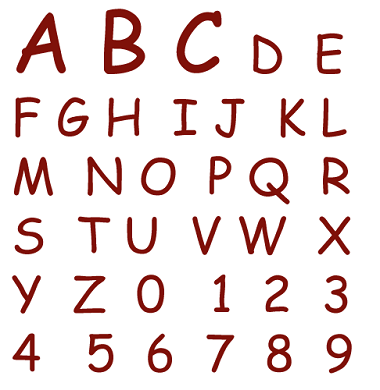Alphanumerals – Unlocking The Power Of Letters And Numbers!
In my online world, alphanumerals are like secret codes, a mix of letters and numbers that keep my accounts safe. Making a password with these characters feels like creating my protective spell.
Alphanumerals are a mix of letters and numbers that help keep our online stuff safe and organize things better in the real world. They make strong passwords, making it tough for bad folks to get in, and they’re like special codes for products.
This article talks about the cool mix of letters and numbers called alphanumerals. Learn how they keep our online stuff safe and help us find things easily in the real world!
What Are Alphanumerals? – Unleash The Power Of Secure Codes!
Alphanumerals are like secret codes that mix letters and numbers. They’re used in many places, like when you make a password for your computer or phone.
These codes are super important because they make it hard for others to guess and get into your private stuff. It’s like having a unique lock only you know how to open!
Mixed Characters also help tag and identify things in the real world, like when you buy a new gadget. The codes make each item unique, so keeping track of them is easy.
Imagine it’s like giving every toy in your toy box its special name – that’s what alphanumerals do for things in the grown-up world.
Why Are Alphanumerals Important? – Unlock Security And Organization!
Mixed Characters are important because they help keep things safe and organized in our digital and real-world adventures. Here’s why they matter:
1. Safe Passwords:
- Alphanumerals are like secret codes for creating passwords.
- They make passwords strong and tough for others to figure out, keeping our online accounts safe from bad folks.
2. Easy Identification:
- In the real world, alphanumerals give things unique names, like a special tag.
- This helps us find and organize stuff, whether a cool gadget or a toy in a big box.
3. Secure Communication:

- When we want to talk secretly online, alphanumerals help ensure our messages are safe.
- They’re like a secret language only the sender and receiver understand.
4. Tracking and Finding Things:
- Alphanumerals are like GPS for items in stores or warehouses.
- They make it easy to find a specific product among many and track it during its journey.
5. Special Codes for Devices:
- When we set up our phones or computers, alphanumerals create special codes to unlock them.
- Only the person who knows the right code can use the device.
6. Unique Vehicle IDs:
- Alphanumerals give cars special numbers (VINs) like their fingerprints.
- This helps with things like registration and keeping track of the car’s history.
7. Protecting Transactions:
- When we buy things online, alphanumerals create secure transaction codes.
- This protects our money and ensures the purchase is safe and sound.
How Do Computers Understand Alphanumerals Characters? – Unveiling The Digital Code!
1. Character Encoding:
Computers employ ASCII (American Standard Code for Information Interchange) to assign unique numerical values to alphanumerals.
In this encoding, letters like ‘A’ are represented by specific numbers, allowing computers to recognize and process them. For instance, ‘A’ corresponds to the number 65 in ASCII.
2. Binary Representation:
Once alphanumerals are assigned numerical values, computers convert these values into binary code, consisting of 0s and 1s.
This binary representation is the language computers understand, enabling them to efficiently store, manipulate, and process alphanumeric information.
3. Storage and Processing:

The binary representation of alphanumerals is stored in the computer’s memory, allowing for quick retrieval and processing by the central processing unit (CPU).
This seamless conversion between numeric and binary forms enables computers to handle alphanumeric data swiftly and accurately.
4. Unicode for Extended Characters:
While ASCII covers basic alphanumerals, Unicode extends the encoding system to include a broader range of characters, accommodating various languages and special symbols.
This ensures that computers can understand and represent different characters beyond the standard English alphabet and numerals.
5. Programming and Communication:
Programmers use alphanumerals to write code, instructing computers on specific tasks. The computer interprets these alphanumeric instructions in a programming language and executes the corresponding actions.
This communication relies on the computer’s ability to comprehend and process Mixed Characters effectively.
6. User Input and Output:
When users input information via a keyboard, the computer translates the pressed keys into their corresponding ASCII or Unicode values.
On the output side, when computers display information on screens, they convert numeric values back into readable alphanumerals, facilitating user-friendly interaction with the system.
What Are Some Challenges With Using Alphanumerals? – Overcome These Hurdles With Our Helpful Tips!
1. Memorization Difficulty:
Crafting and recalling complex alphanumerals for multiple accounts can be tricky, creating a hurdle in maintaining strong and secure passwords.
This challenge intensifies with frequent password changes, adding to the difficulty of retaining various alphanumeric combinations.
2. Accessibility Concerns:
Certain individuals, especially those with memory issues, may struggle to remember Mixed Characters. When codes are overly complex, they can impact user-friendly experiences, emphasizing the need for a balance between security measures and accessibility.
3. Balancing Security and Usability:

Achieving the right balance between a secure alphanumerical code and user-friendly accessibility is crucial.
Excessively intricate codes might lead users to opt for less secure alternatives, potentially compromising overall security in the pursuit of ease of use.
4. Technology Dependency:
The effective use of Mixed Characters relies on the appropriate technological infrastructure. Compatibility issues or reliance on outdated systems may limit the functionality and efficiency of Mixed Characters in certain contexts.
5. Learning Curve:
For those unfamiliar with alphanumeric systems, there may be a learning curve. Quick adaptation to using Mixed Characters might be challenging for individuals encountering them for the first time, requiring additional time for understanding and implementation.
6. Code Entry Errors:
Complex Combo Characters increase the risk of entry errors, particularly during manual input. Mistyped codes may result in authentication failures or difficulties accessing secured information, highlighting the importance of accuracy in code entry.
Frequently Asked Questions:
1. How do alphanumerals help in data entry and organization?
Mixed Characters streamline data entry by providing a concise way to represent information. They contribute to the efficiency of an organization by ensuring unique identification, particularly inventory management.
2. What is the role of alphanumerals in secure communication?
Combo Characters play a role in secure communication by forming part of encrypted codes and passwords. They help ensure that messages and data are transmitted and stored securely.
3. Can alphanumerals be used in offline settings?
Absolutely. Combo Characters are not limited to the digital realm; they are extensively used offline for product labelling, identification, and organization.
4. What are the limitations of using alphanumerals?
Some limitations include difficulties in memorization, potential entry errors, and the need for appropriate technological infrastructure for effective implementation. Balancing security and user accessibility is also a challenge.
Conclusion:
Alphanumerals are like secret codes that mix letters and numbers, making our online world safer with strong passwords. They also help organize things in the real world, like products in a store.
Read:





